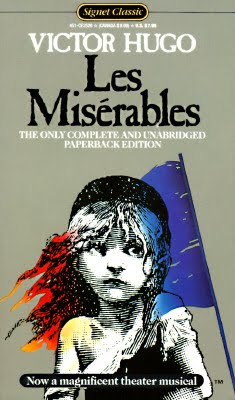
 I was searching literary lists trying to decide which novel to cover this week when I saw something that made my jaw drop and my head shake in a bewildered double take- Les Misérables, the classic novel by Victor Hugo about the trials and tribulations of an intertwined group of people during the June Rebellion in France (1832), was on the list as a banned book!
I was searching literary lists trying to decide which novel to cover this week when I saw something that made my jaw drop and my head shake in a bewildered double take- Les Misérables, the classic novel by Victor Hugo about the trials and tribulations of an intertwined group of people during the June Rebellion in France (1832), was on the list as a banned book!
Considered a work of historical fiction because it contains factual accounts of historical events it is one of the greatest novels of the 19th Century- and arguably of all time- as it follows the lives and interactions of several characters, primarily that of ex-convict Jean Valjean and his journey of redemption. Through the years that come to life in between its covers the novel also touches on such social themes as the nature of law and grace, politics, philosophy, antimonarchism, justice, religion, and both romantic and familial love.
The book was a great commercial success despite Hugo living in exile in England upon its publication in 1862; he had been banished from France for life by Napoleon III for criticizing his government. After the Siege of Paris, Hugo lived on the island of Guernsey from 1872-73 before finally returning to France for the remainder of his life, where he died May 22, 1885.
Published amid a massive advertising campaign and at a time when Hugo was adored as one of France’s foremost poets the release of the novel was a highly anticipated event. Critical reactions were often negative, though, as some critics found the subject matter immoral and others complained of its excessive sentimentality; others were concerned with its apparent sympathy with the revolutionaries.
As with anything pleading for social change, the novel acquired many conservative enemies who feared the social impact of the novel. Common reasons for banning it included displaying prostitution, murder, “portraying the Church as unimportant”, and glorifying the French Revolution.
All of Victor Hugo’s works- past, present, and future- were banned in 1850 by Tsar Nicholas I because of Hugo’s less-than-flattering depiction of royalty; his works were also listed on the infamous Index Librorum Prohibitorum– the Catholic Church’s list of books forbidden among members of the faith. Les Misérables was added to the Index in 1864, where it remained until 1959 because it was considered to be critical of the clergy and the papacy.
Hugo’s Hunchback of Notre Dame had been added to the Index in 1834 because Church censors found it to be “too sensual, libidinous, and lascivious.” Likewise, they argued the same thing about Les Misérables when it joined the list.
Even as recently as 2006, some Catholic officials still feel that the book and its adaptations are unsuited for children and teenagers.
In 1904, it was banned from a Philadelphia school because it contained a French word associated with prostitution- grisette, a working class woman or “good-time girl”.
Despite what some may consider seditious, immoral, or inappropriate material, the story in all of its incarnations remains a beloved addition to many a bookshelf and adored on stage and screen. A new highly-anticipated theatrical version with an ensemble cast of A-list stars is set for release this holiday season.
For more information on the Banned Books Awareness and Reading for Knowledge project and the complete list of titles covered, please visit the official website at http://www.deepforestproductions.com/BBARK.html
Sources: American Library Association, Wikipedia, Dangerous Pages
© 2012 R. Wolf Baldassarro/Deep Forest Productions

Leave a Reply